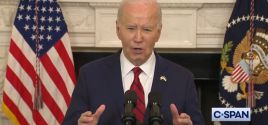Shielding "Professionals" from Competitionby S.M. Oliva, Mises Economics BlogSep. 12, 2010 |
Popular 
Claim Jewish Student Was 'Stabbed In The Eye' by Pro-Palestine Protester Draws Mockery After Video Released

Senate Passes $95B Giveaway to Israel, Ukraine, and Taiwan, Combined With TikTok Ban

'These Protesters Belong in Jail': Gov. Abbott Cheers Arrest of Pro-Palestine Protesters at UT Austin

Biden Signs Bill to Give $95B to Israel, Ukraine and Taiwan, Ban TikTok

Mistrial Declared in Case of Arizona Rancher Accused of Killing Migrant Trespasser
 John F. Sturm, the president of the Newspaper Association of America, thinks it’s high time Congress intervene to protect the free flow of information -- that is, the flow of information from confidential government “sources” to “professional” journalists. In an op-ed, Sturm said the republic cannot endure the type of unprofessional muckraking provided by websites like Wikileaks.org: Unlike the source-to-screen approach of Wikileaks, professional journalists do more than simply post raw data. The important role journalists play in our democracy can never be replaced by websites that publish source documents without the editorial oversight, research, analysis and balanced reporting that are so essential to public understanding and debate.Oh, where to begin? First there’s the laughable idea that Sturm values the “public’s right to know.” Protecting confidential sources does just the opposite; it deprives people information about the sources of a reporter’s information. As I’ve said before, if a product manufacturer refused to disclose its ingredients, “professional” journalists would have a conniption. Second, posting “raw data” doesn’t replace research and analysis; it supplements it by decentralizing control of basic information. That in turn helps produce a greater quantity -- and yes, quality -- of analysis from different sources. Sturm’s idea of journalism is having a bunch of people talk to Bob Woodward “off the record” so he can then tell us what our government wants us to know. Third, the “balanced reporting” canard is quite tired. Nobody believes it. Besides, how often do you see establishment newspapers take libertarian or non-governmental views into account? Moving to the substance of Sturm’s op-ed, Supporters of a federal shield law acknowledge that it would not be reasonable to protect the source’s identity in every case, which is why the Senate bill contains extremely broad exceptions when the government seeks information from a journalist that could thwart a terrorist attack or otherwise prevent harm to national security.So the shield law really doesn’t protect anything at all. Governments are quite adept at using “broad exceptions” to their advantage. And no exception purportedly limited to “national security” or “terrorism” cases stays that way for long. The Patriot Act was once amended to give the DOJ unlimited wiretap authority in antitrust cases. The Antitrust Division claimed it wasn’t fair that anti-terrorism prosecutors got special powers that they didn’t. After all, isn’t fighting antitrust “crimes” just as important as thwarting al-Qaeda? Opponents are wrong to suggest that a federal shield law would encourage more government leaks. With a clear legal framework for when a journalist can and cannot protect a source, both journalists and potential leakers will likely be more mindful of whether public disclosure of confidential or classified information would truly serve the greater good.How exactly does one determine what the “greater good” is ex ante? Since government ultimately deems itself the arbiter of public good, it can easily overrule any contrary private determinations made by “leakers” and “journalists.” Sturm also ignores the fact that most “leaks” have nothing to do with informing the public whatsoever. Leaks are simply politics by other means. A White House official leaks a policy memo to send a message to political opponents in Congress. A prosecutor leaks confidential grand jury information to publicly smear a defendant. This is why “raw data” is often more valuable then the carefully orchestrated leaks managed by journalists. Sturm rebuts, Moreover, with more legal certainty, potential leakers may be more inclined to work with professional journalists who are more likely to get the story right, rather than simply upload classified documents to faceless websites. This is important because the professional news media regularly take national security into account in their reporting. They exercise editorial judgment and, in exceptional situations, work with the government to protect intelligence sources or methods -- and human lives -- while still fulfilling their journalistic duty to inform the public.So, according to Sturm, journalists are just another arm of the government. Good to know. Sturm ends his op-ed by saying passage of a federal shield law “heeds the warning from our founding fathers: a free and democratic society cannot survive without an informed citizenry.” This may be the least on-point invocation of the founders I’ve ever read. For one thing, there were no “professional” journalists in colonial times -- at least not as Sturm defines them. Indeed, much of the newspapering of the time came from anonymous and pseudonymous partisans who valued ideas over confidential “sources.” What Sturm wants, of course, is the federal government to intervene in the dying newspaper market and save it from Internet-based competition. This is why the Federal Trade Commission has been holding b.s. “workshops” on this subject. A shield law is an important step towards cartelizing journalism under federal control. Once you have a shield law, you have to define what a journalist is and is not. This becomes a judicial (and regulatory) question that requires input from all sorts of lawyers, academics, and other “experts.” The process alone will exclude the blogger (*cough*) who simply wants to bring greater transparency to the state and its harmful interventions. This is a special-interest power grab, one that would alter the First Amendment by decree. Sturm wants “freedom of the press” to mean “privilege of government-licensed journalists.” This would bring journalism closer to a university model of “academic freedom” -- special rights for tenured elites -- while doing nothing for the people that Sturm says he wants to better inform. |



